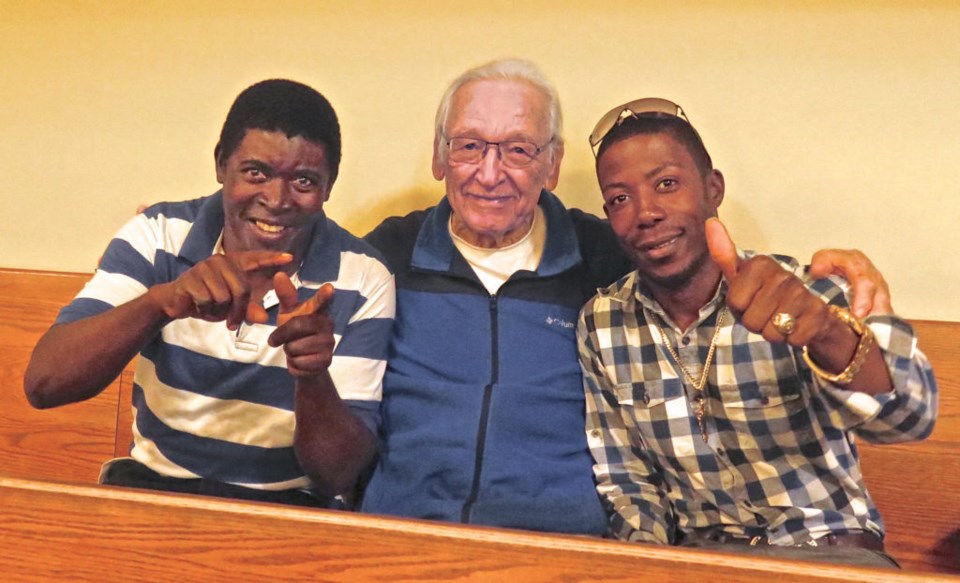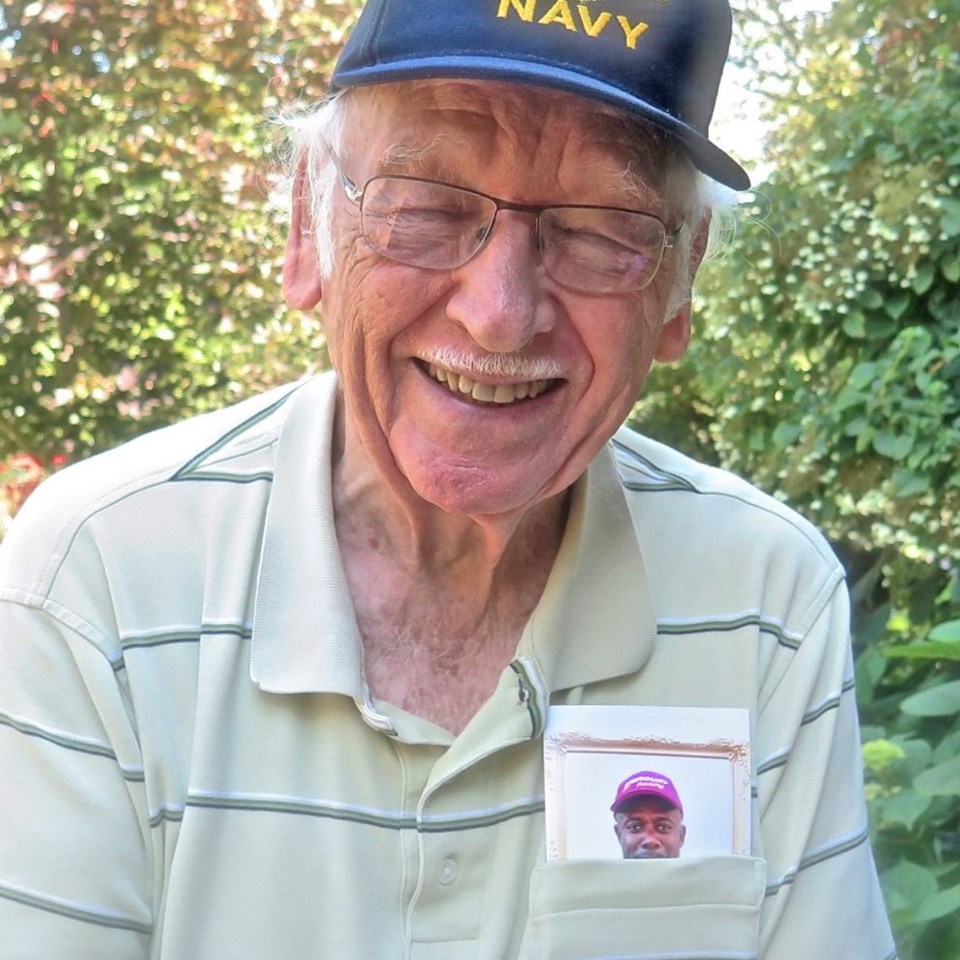
They say such nice things about people at their funerals that it makes me sad that I’m going to miss mine by just a few days. — Garrison Keillor
My father, Ruben Friesen, passed away on Dec.10 at 94 years of age. He maintained his quirky, gentle sense of humour — much like his favourite humourist and story teller, Garrison Keillor — until his last few days.
He was born in Hepburn, Saskatchewan in 1925 to John and Emma Friesen, preceded by two sisters, Hilda and Evelyn. Grandma was surprised when, within minutes of his arrival, another sister made an unexpected appearance and they named her Ruby. Miriam, Josie and Stan followed in the decade known as the dirty 30s. The stock market crashed and dust storms plagued the western provinces, forcing most farmers off the land. My grandfather’s salary of less than $18 a week just wasn’t enough to keep everyone fed.

His mom found ways to make a few pigeons stretch into a pot of soup to feed the family. As a nine-year-old, he was small enough to edge his way along the girders under a bridge in Saskatoon spanning the South Saskatchewan River, where he could pluck young pigeons from their nests. He took them home and raised them for food. The next year, grandma put an end to it after another young boy attempted it and fell 75 feet to his death.
Independent, resourceful and loyal are the first words that come to mind about my father when listening to him reminisce. There were many experiences in his childhood that shaped his character and defined his values his entire life.
With food in tight supply, he was sent out to spend summers with his grandparents, P.J. and Marie Friesen, on their little farm in Hepburn. He became especially close to them and enjoyed the time away from the chaos and cacophony of a large family and boarders in their overcrowded home. His grandparents appreciated his help with the chores and he enjoyed the camaraderie of the men who worked on the farm. He was especially intrigued with one good-natured farm hand who played harmonica and left it stashed under his hay-filled mattress while at work during the day. Dad taught himself to play on it while the men were at work, always careful to put it back in the exact same spot before they came home.
When he was 11, he was told that his grandfather was seriously ill. They had no phone so the only way to find out how his grandpa was doing, was to make the trip to Hepburn. He begged his father to take him along, and so they began the long trek on a shared bicycle, after his father had put in a full day of work. Thirty miles, bumping along on gravel roads in the dark, would have been an impossible challenge to many, but family loyalty and devotion overcame any thought of turning back.
It was a clear night, with nothing but the stars to light the way, but halfway on their journey, the magic began. It started as a wisp of light, which undulated and grew in waves, until the Northern Lights stretched throughout the entire prairie sky like a shimmering curtain. The sound waves crackled and hummed a strange, otherworldly type of music that drew them onward, re-energizing them through the final hours of their journey.
They knocked on the door of the little farm house after 1 a.m., surprising his grandmother. It was an unforgettable experience that he recounted to me in the hospital, one of many stories of hardship that shaped his character and forged a deep loyalty to family that remained with him until the end.
In 1941, my dad and his father, John Friesen, took the long bus ride to Niagara in search of employment. They rented a room on Russell Avenue and shared a single bed, taking turns to sleep while working different shifts. After saving for two years, Grandpa purchased Shaw Cleaners, a tiny dry cleaning shop on Lake Street, which offered a new start and employment for the entire family.
Their social lives pretty much centred on activities at Calvary Church, and in 1951, it was also where my dad married Velma Funk, the sister of his long-time friend, Pat Funk.
The Friesen clan expanded and by 1963 my parents were blessed with four daughters, each three years apart — myself, Debbie (Wiecha), Marilyn (Trout) and Cathryn (Peck).
For 44 years, my father continued to operate the family business, Modern Dry Cleaners.
It didn’t prevent him from chasing other adventures, such as his love of flying. With little cashflow but with the help of a few friends and plenty of perseverance and ingenuity he built a Pietenpol, an open cockpit, two-seater airplane, in our garage.
He played clarinet, but the instrument of choice right until the last few weeks was the harmonica. He always had one tucked into a pocket at the ready whenever a moment presented itself.
Growing up, we felt so lucky to have a dad who was just as excited about lighting off firecrackers as we were, could hide in a pile of leaves, and introduced us to the wonders of nature on the Bruce Trail or camping trips.
What made a lasting impression on me, was how he quietly served those who were invisible or living outside the boundaries of our comfortable community. He sought no recognition and preferred to be in the background. People could count on him to show up when there was a need.
After retiring, he was passionate in serving on the board for International Child Care and Grace Children’s Hospital in Port-au-Prince, Haiti for many years.
He relied more on his imagination than his pocketbook for fundraising, stepping out in faith in some extraordinary ways. One such example was the time he, my mom and twin sister Ruby, and Bill Murdoch set out with five Haitian vocalists on a tour across Canada, with little more than a map, some phone numbers and a credit card. Summer and fall weekends, he would sell hundreds of bushes and evergreens donated by Leno Mori at the St. Jacob’s market, with all proceeds supporting ICC.
After they moved to Pleasant Manor, he loved accompanying me on farm visits. He felt a kinship with the men and took great delight in sharing stories when driving them around to shop for deals to ship home.
He encouraged my vision of creating an event for farm workers that would make them feel welcome in our community many times, when I was doubting myself or feeling the weight of opposition.
The high point of his week was attending the CWOP (Caribbean Worker Outreach Project) church services on Sunday nights in May or June.
He loved the lively singing which reminded him of his experiences in Haiti. The warm welcome and camaraderie was energizing, filling him with a youthful enthusiasm. To observe him interacting with his many friends at the last Father’s Day service was a gift I will always treasure!
He lived humbly. His most prized possessions the last few years of his life were his harmonica, and pilot’s log books dating back to 1945. He loved to review its yellowed pages and study the dates and names of the people he took flying, most of them people that could never afford to experience flight in a small aircraft.
There was much time to reflect beside his hospital bed over the last two months.
That long journey, illuminated by the brilliance of the Northern Lights was also a boy’s introduction to grief for the first time in his young life. The feelings of joy mixed with grief remained clearly etched in his memory – and the certainty that we are not alone on our journey.
The delight he found in kinship with others and the gift to see beyond barriers of culture and privilege, is an inheritance that I will always hold close to my heart.
Dad will be remembered by many for his generosity, gentle humour, a tender heart and his ever-present harmonica.
I’ll always remember him with his hand outstretched in welcome, and hope to honour him by continuing on that journey.